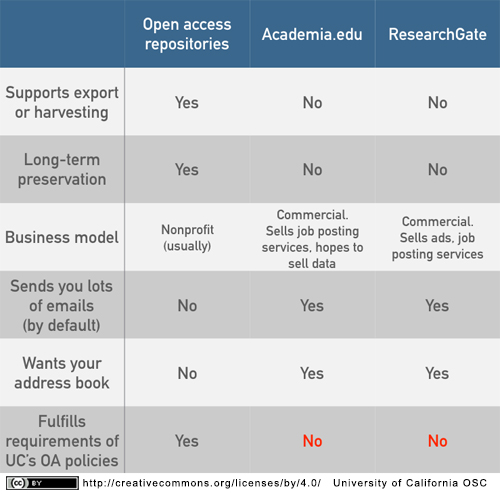Using Zenodo as a personal repository
More and more academics are using services like academia.edu and researchgate as personal repositories. This is in part a way of ensuring your research gets wide exposure (and hence is more available for citation). But it is also part of an increasing sense among academics that one “ought” to put off-prints and pre-prints of research “out there” for others to find. This is being encouraged by Open Access mandates that encourage or require researchers to post copies of their work (i.e. so-called “Green Open Access”), either in last manuscript version or as soon as the embargo period is over at the journal of record.
As the University of California Office of Scholarly Communication points out, however, Academia.edu and ResearchGate are not really Open Access repositories: they are social networking sites for academics that use offprints the way Facebook uses pictures of your family—as a way of getting friends and colleagues to come to the site and click around.
And ironically—or perhaps not—neither are actually that great at spreading the word about your work. As anybody who has ever got an email from those sites telling you that “3 people have looked at your work” (which means everybody on them), the sites hide as much information about the use of your work as they reveal. If you’ve ever tried to add a paper from either to your bibliography using their DOI or other form of citation harvesting, you’ll also know that their bibliographic standards leave a lot to be desired. And finally, none of them promise any kind of long-term preservation: the terms and conditions of both sites allow the owners to remove your work without notice for any reason.
Here’s a great chart showing some of the major disadvantages of the networks when compared to a true Open Access Repository:

So what to do if you really want to get your work out there, but in a permanent, responsible, and citable fashion?
Well, one answer is the Institutional Repository or IR (here’s mine). The advantages of this are that it is
- professionally curated (usually in the library);
- as permanent (at least) as your institution is likely to be; and
- harvestable (assuming they are using some of the standard solutions) and all the rest.
The disadvantages are that it is
- your institution’s space, and not yours (you may have a piece of it, but it is really about the institution; if you leave, your ability to post to it will stop);
- almost certainly some bureaucracy involved to getting your work in;
- by definition “provincial”: where Academia.edu and ResearchGate collect everybody’s work in a central location, your IR collects only your institution’s work;
- you have to belong to an institution—many of the people who need to show off their work the most (i.e. those looking for work or finishing up graduate degrees) do not have easy or consistent access to one.
Another solution is FigShare, which is a commercial pre-print server but one that largely answers the issues raised by the UC Office of Scholarly Communication.
A third solution, however, is Zenodo. This is a data repository established by the EU at Cern, but open to all. It takes most data sets (including PDFs and, interestingly, Github repositories) and gives everything a DOI. And you can organise deposits by creating communities.
This feature allows you to do things like publish journals (e.g. our graduate student journal). Or supplement journal articles and books with datasets.
But it also allows you to publish a personal, long term (Zenodo is promised to exist at least as long as CERN does) Personal repository (here’s mine). Put articles up to Zenodo and then you get a DOI and a URL that you can put in your CV. If you put your bibliographic information in carefully, it can be harvested by citation managers very easily. And it is indexed by Google Scholar.
What’s not to like?

Comment [5]
Diego Maranan (Fri Mar 13, 2020 (08:19:01)) [PermLink]: Hi Daniel, thanks for this helpful post. I use Zenodo and would like to my institution to use it, but it doesn’t look like Google Scholar indexes Zenodo, as you’ve written. I tried searching in a few titles of your Zenodo uploads in Google Scholar but they don’t show up (for example, https://is.gd/6BPM4u) Am I missing something? Thanks!
Dan O'Donnell (Fri Jun 19, 2020 (10:12:21)) [PermLink]: @Diego. Interesting. I thought it did. I’ll try some more experiments later.
Tushar Nanda (Mon Jan 3, 2022 (22:47:46)) [PermLink]: Hi Daniel,
Did you manage to try if Zenodo gets indexed in Google scholar ?
Daniel O'Donnell (Mon Jul 25, 2022 (13:45:35)) [PermLink]: @Tushar: no, it appears it really does not get indexed. There is a ticket for it in the Zenodo GitHub site. But it’s a real issue since so much is now being published via it.
Maha (Mon Oct 31, 2022 (00:36:56)) [PermLink]: Hi
i have a verey important q, is Zenodo indexed in any of pubmed or web of scince?

